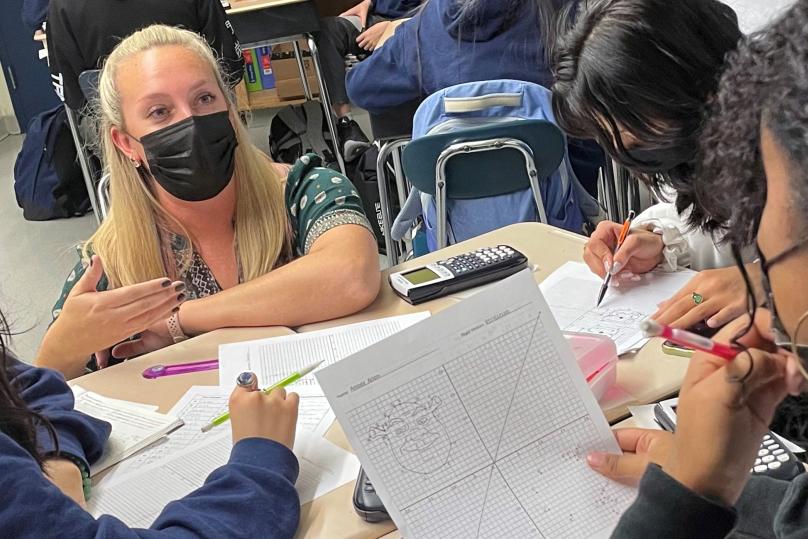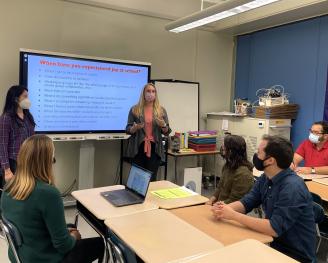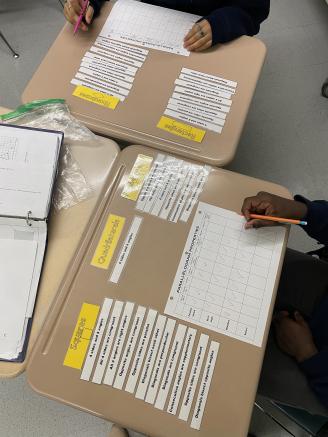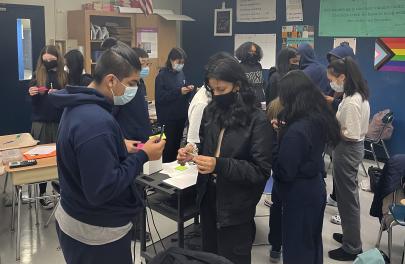
How MƒA gave Sarah Geist the confidence to transform PD and instructional learning at her school.
About four years ago, MƒA Master Teacher Sarah Geist was introduced to an idea that would transform her teaching forever: During every class, each and every student needs to talk out loud about math — even if it’s only a sentence or two — in order to internalize what they’re learning.
“This seemingly basic idea wasn’t something I had thought about in such a simple way before,” Geist says. “I had been doing small group discussions my whole teaching career, and I didn’t even realize how ineffective they had been.”
Soon after learning this concept in an MƒA mini-course on the All Learners Learning Every Day (ALL-ED) framework, Geist put it into practice in her own classroom. Now, after students in each small group have the opportunity to write on their own about a question they’ve been given, each student is provided time to share their ideas before the group launches into a more open discussion.
“This made discussions vastly more equitable and accessible for many students who had not felt comfortable participating in my class before,” Geist says. Thrilled by the impact on her own classes, she immediately started sharing some of the routines and practices she’d learned with her fellow math and science teachers at Manhattan Village Academy, a small public high school in the Chelsea-Flatiron area.

When Geist later joined an MƒA professional learning team (PLT) focused on making geometry accessible for all learners, she had another lightbulb moment. While past professional development (PD) experiences outside of MƒA had struck her as too top-down and not fully accessible for STEM teachers, these workshops were designed by teachers, for teachers, and included practical ideas and resources that could be applied immediately in the classroom. By participating in and later co-facilitating that Geometry for All PLT, Geist gained the confidence to lead and transform PD efforts at her own school.
Geist initially fell in love with teaching as a college student volunteering in high schools around the Dallas area. “It opened my eyes to the inequities in education and how different public schools can be,” she recalls. She began working at Manhattan Village Academy soon after earning her degree. In addition to teaching geometry and algebra II, she is head of her school’s math department and 10th grade team leader.
“During my first several years here, PD was presented to staff as a whole rather than by department,” Geist remembers. “Things were not always relevant to STEM courses, and we didn't have time to think about and talk to our peers about how we would make something like this work in our own classes. There wasn't a lot of follow-up, and the teachers didn't have much say in what professional development focused on.”
After her experience in the MƒA Geometry for All PLT — both as participant and facilitator — Geist knew that PD could be effective, popular, and accessible to all subjects. When her school’s new principal asked if anyone was interested in joining a team for planning PD and instructional leadership, Geist volunteered.
"Having such a positive experience at MƒA, and facilitating along with other teachers I trust and admire, really made me feel comfortable doing it at my own school.”

She and the other team members, both English teachers, started by sending out surveys in Google Forms to get input from teachers on what they needed and what was going well, just as Geist does as an MƒA facilitator. Using this input, they created PD sessions that addressed teachers’ needs, making sure to include practical ideas and resources that were accessible to all subjects.
When teachers asked to focus PD more on student-to-student discussion and student-centered lessons, Geist shared some of the routines she learned in the ALL-ED MƒA mini-course, including “Rumors,” an activity that gets students on their feet, listening and talking to each other. She devoted another learning session to sharing an exercise where students match cards with written descriptions and corresponding graphs to show their understanding of transformations in geometry. Later, two fellow staff members dropped by her classroom to see the matching activity in action and get tips on how to use it with their own students.
The teacher-led approach to PD has also helped when it comes to implementing the district-wide focus on CRSE (Culturally Responsive Sustaining Education). Geist is currently in another PLT at MƒA focused on using CRSE in STEM classrooms, and has been able to bring back what she learned to her school. “We showed examples of lessons we've done where we try to embed these ideas of identity with our students,” Geist says. “After providing these examples for the staff, we had everyone meet in pairs and go over ideas that they had for their own lessons.”
Geist’s colleagues have responded extremely well to the new approach over the past two years, with math and science teachers in particular expressing appreciation for material that is more applicable to their content area. Geist has seen firsthand the impact of the new ideas in other teachers’ classrooms and lesson plans, even as the Instructional Leadership Team itself has expanded to include six teachers from all different disciplines.
“The MƒA environment is very positive, and teachers here are really committed to trying new things, taking risks, and trying to improve their teaching practices,” Geist says. "Having such a positive experience, and facilitating along with other teachers I trust and admire, really made me feel comfortable doing it at my own school.”
